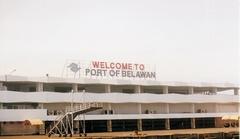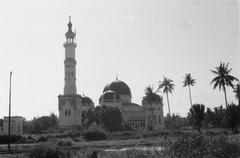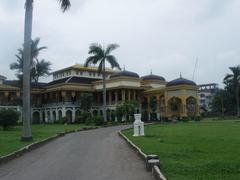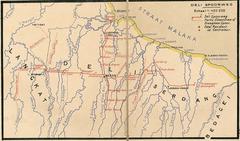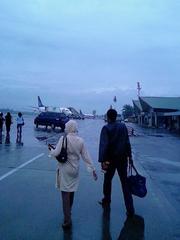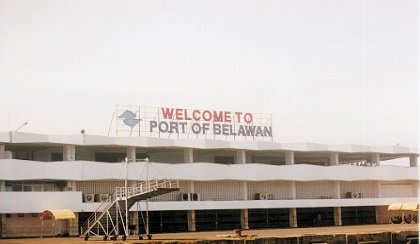
Port of Belawan Visiting Hours, Tickets, and Travel Guide: Medan Historical Sites
Date: 15/06/2025
Introduction: History and Significance of the Port of Belawan
Belawan Port, located on the northeast coast of Sumatra near Medan, is Indonesia’s busiest seaport outside Java and an essential link for North Sumatra’s economy. Established in 1890 during the Dutch colonial era to support the region’s booming plantation exports, the port has continually evolved into a modern hub for trade, handling millions of tons of cargo annually. Its strategic position near the Malacca Strait connects Indonesian industries to international markets and makes Belawan a key gateway for both commerce and cultural exchange (FreightAmigo; IndonesiaTradeData).
Beyond its economic impact, Belawan offers a window into Indonesia’s maritime heritage, with nearby historical sites in Medan, vibrant communities, and unique culinary experiences. Modern upgrades, like the Belawan New Container Terminal (BNCT), are enhancing capacity and sustainability, positioning the port for future growth (Maritime Fairtrade).
This guide provides a comprehensive overview for visitors, covering historical context, practical visiting information, transportation, and nearby attractions, ensuring a rewarding journey through North Sumatra’s dynamic port and surrounding city (Pelindo; Wikipedia).
Table of Contents
- Introduction
- Historical Overview and Economic Significance
- Port Infrastructure and Facilities
- Visitor Information: Visiting Hours, Tickets, and Access
- Cruise and Ferry Experience
- Explore Nearby: Medan Historical Sites and Attractions
- Local Transportation and Getting Around
- Weather and Best Time to Visit
- Safety and Health Tips
- Dining and Local Cuisine
- Nightlife and Events
- Practical Travel Tips
- Future Developments and Prospects
- FAQ
- Conclusion
- References
Historical Overview and Economic Significance
Early Development and Colonial Era
Belawan’s origins trace to 1890, when the Dutch developed the port to serve North Sumatra’s plantation economy—primarily exporting tobacco, rubber, palm oil, and other crops. Its strategic location along the Malacca Strait made it a major trade gateway, rapidly expanding with Dutch investments in rail and port infrastructure. By the early 20th century, it was already one of Indonesia’s most important ports outside Java (FreightAmigo).
Post-Independence Growth and Modernization
Following Indonesia’s independence, Belawan expanded its facilities and diversified exports to include oil, forest products, and manufactured goods (IndonesiaTradeData). By the late 20th century, the port managed around 12 million tons of cargo and over 400,000 TEUs (Twenty-foot Equivalent Units) annually.
Regional and National Importance
Belawan remains the primary export gateway for Sumatra’s palm oil, rubber, tea, coffee, and forest products. Its proximity to Medan, a major urban and economic center, enhances its strategic value. The port’s location near the Malacca Strait, one of the world’s busiest shipping lanes, connects Indonesia with neighboring countries and global shipping routes (Maritime Fairtrade).
Recent Upgrades and Partnerships
The 2023 expansion of the BNCT (Belawan New Container Terminal), a collaboration between INA, Pelindo, and DP World, aims to double capacity and introduce advanced logistics and sustainability measures. This project is designed to strengthen Belawan’s role as a regional transshipment hub and drive future growth (Maritime Fairtrade).
Challenges and Opportunities
While Belawan faces challenges like infrastructure limitations and the need to accommodate larger vessels, ongoing modernization and digitalization efforts are addressing these issues to enhance efficiency and sustainability (CustomsPedia).
Port Infrastructure and Facilities
Layout and Capacity
Belawan Port comprises multiple wharves and terminals, such as Belawan Lama, Ujung Baru, Ferry Wharf, and Citra Wharf. The modern BNCT supports increased container capacity and advanced handling equipment.
Annually, the port processes about 2,000 vessels and 12 million tons of cargo. The BNCT’s expansion targets up to 1.4 million TEUs in the coming years, reinforcing Belawan’s importance along the Malacca Strait.
Connectivity
Well-developed road links connect the port to Medan and North Sumatra’s hinterland. International ferry routes link Belawan with Penang, Malaysia, and regional destinations.
Passenger Facilities
The passenger terminal accommodates domestic and international arrivals with basic amenities, including waiting areas, ticketing counters, and customs/immigration services. While not as extensive as major cruise terminals, they provide necessary services for ferry and cruise travelers.
Environmental Initiatives
Belawan is implementing Green Port practices focused on energy efficiency, waste management, and biodiversity. International collaborations, such as with the Port of Los Angeles, support these sustainability goals.
Visitor Information: Visiting Hours, Tickets, and Access
Visiting Hours
- Cargo Operations: 24/7 (restricted to authorized personnel)
- Passenger Terminal: Generally open 6:00 AM to 10:00 PM daily (dependent on ferry/cruise schedules)
- Public Areas (seafood markets, villages): Typically open 7:00 AM to 6:00 PM
Always confirm specific visiting hours with your ferry/cruise operator or tour provider before arrival.
Tickets and Guided Tours
- Ferry Tickets: Available at port counters, authorized agents, or online (advance purchase recommended during peak seasons)
- Cruise Tickets: Managed through cruise lines
- Guided Tours: Offered by local operators, often including the port, nearby villages, and Medan cultural attractions. Prices start around IDR 150,000 per person.
Access to operational zones is restricted for security; public and tour access is limited to designated areas.
Cruise and Ferry Experience
Cruise Ship Arrivals
Belawan is a port of call for major cruise lines, accommodating large vessels and providing direct access to Medan’s attractions (CruiseMapper).
Ferry Services
- Domestic: Regular ferries connect Medan with Batam, Tanjung Balai Karimun, and Jakarta (Wikipedia).
- International: Frequent ferries run to Penang, Malaysia; schedules may vary, so check in advance.
Explore Nearby: Medan Historical Sites and Attractions
Medan City Center (25 km from Belawan)
- Maimoon Palace: 19th-century royal residence blending Malay, Islamic, and European styles (Holidify).
- Tjong A Fie Mansion: Historic mansion reflecting Medan’s multicultural heritage.
- Grand Mosque of Medan: Iconic early-20th-century mosque.
- Merdeka Walk: Open-air cafes and night markets.
Nature and Day Trips
- Lake Toba: World’s largest volcanic lake (approx. 90 km from Medan).
- Bukit Lawang: Renowned orangutan rehabilitation center and entry to Gunung Leuser National Park.
- Berastagi: Highland retreat with fruit markets and hot springs.
Local Experiences
- Seafood Markets: Near the port, offering fresh catches and local delicacies.
- Fishing Villages: Observe traditional boat-building and fishing methods.
Local Transportation and Getting Around
- From Medan: Taxis, ride-hailing apps, and minibuses (“bemo”) are available. The trip from Medan city center to Belawan takes 40–60 minutes (Southeast Asia Pilot).
- From Kualanamu Airport: 27 km to the port; taxis and ride-hailing services are most convenient.
- Within Belawan: Explore public areas on foot or use local transport.
Weather and Best Time to Visit
Belawan experiences a tropical climate with year-round temperatures of 22–32°C. The rainy season (October–March) brings heavy rainfall, especially in December and January. The dry season (April–September) is best for sightseeing (PortGuide).
Safety and Health Tips
- General Safety: Watch for petty theft; keep valuables secure.
- Health: Drink bottled/filtered water; avoid tap water. Medical facilities are available in Medan.
- COVID-19: Check current health protocols and entry requirements.
Dining and Local Cuisine
- Signature Dishes: Mie Aceh (spicy noodles), ikan bakar (grilled fish), soto Medan (coconut milk soup).
- Restaurants: Try Bihun Bebek Kumango (duck vermicelli) and Mie Zhou (noodle specialties) (Fodor’s).
- Street Food: Abundant near markets and in Medan city.
Nightlife and Events
Nightlife in Belawan is modest, with local bars and eateries. Medan offers a wider array of evening entertainment. The annual Pesta Laut (Sea Festival), usually in July or August, features traditional ceremonies and communal festivities (MarineLink).
Practical Travel Tips
- Language: Bahasa Indonesia; English is spoken in tourist areas.
- Currency: Indonesian Rupiah (IDR); ATMs in Medan.
- Connectivity: SIM cards and mobile data widely available.
- Dress Code: Modest attire, especially at religious sites.
- Tipping: Appreciated but not mandatory.
Future Developments and Prospects
Belawan is central to Indonesia’s maritime strategy, with ongoing investments in terminal expansion, digital logistics, and environmental upgrades. The Belawan Northpoint Master Plan focuses on integrating the port with Medan’s urban area and promoting sustainable development (Humanitarian Capital). The vision for 2040 is to establish Belawan as a major regional transshipment and logistics hub (IAPH World Ports).
Frequently Asked Questions (FAQ)
Q: What are Belawan Port’s visiting hours?
A: The passenger terminal is open 6:00 AM–10:00 PM; public areas like markets operate 7:00 AM–6:00 PM. Cargo operations are 24/7 but not open to the public.
Q: Is an entrance fee required?
A: Entry to public areas is free; guided tours may incur fees.
Q: How do I get tickets for ferries?
A: Purchase at the port, through agents, or online via official sites like Pelni.
Q: Are there guided tours?
A: Local operators offer tours of the port’s public zones and nearby attractions; booking ahead is advised.
Q: What are must-see historical sites in Medan?
A: Maimoon Palace, Tjong A Fie Mansion, Grand Mosque, and local markets.
Conclusion
Belawan Port is a vital node in Indonesia’s maritime landscape and a gateway to North Sumatra’s rich history and culture. With ongoing expansions and green initiatives, it is poised for an even greater role in regional trade. For travelers, Belawan offers access to vibrant seafood markets, local traditions, and Medan’s historical treasures. Plan your visit in advance, explore local tours and events, and immerse yourself in North Sumatra’s dynamic blend of commerce and culture.
For up-to-date schedules, visitor information, and guided tour options, download the Audiala app and follow us on social media. Start your journey at Belawan Port and discover the best of Medan and North Sumatra!
References
- Indonesia’s Strategic Ports: Gateways to Global Trade and Economic Growth, FreightAmigo
- Indonesia Sea Ports Overview, IndonesiaTradeData
- Indonesia-DP World Sign Deal to Double Capacity at Belawan New Container Terminal, Maritime Fairtrade
- Overview of Indonesia Shipping Ports, CustomsPedia
- Port of Belawan, Wikipedia
- Port of Belawan Visitor Guide, Southeast Asia Pilot
- Port of Belawan Facilities and Services, Pelindo
- Port of Belawan Cruise and Ferry Information, CruiseMapper
- Medan Sightseeing and Things to Do, Holidify
- Port of Belawan, MarineLink
- Port of Belawan, LogCluster
- Port of Belawan, Fodor’s
- Port of Belawan, PortGuide
- Belawan Northpoint Master Plan, Humanitarian Capital
- D.pdf, IAPH World Ports
- Audiala
